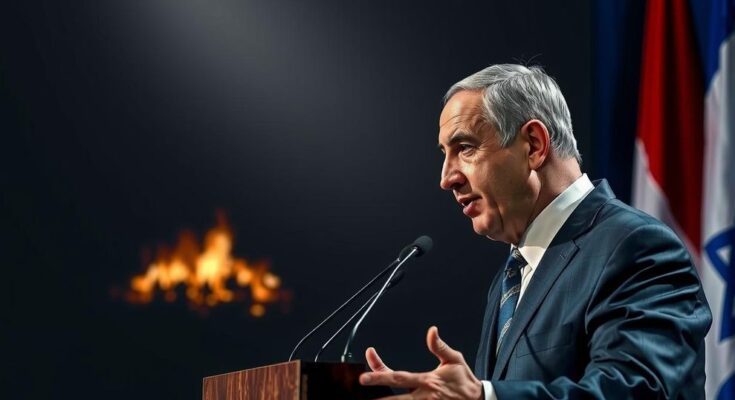Israeli Prime Minister Benjamin Netanyahu stated that the ceasefire with Hezbollah does not mean the war is over, emphasizing his government’s readiness to respond to ceasefire violations. Claims of violations were exchanged between Israeli and French officials, with escalated military actions highlighting the ongoing tensions. Israeli Defense Minister Katz indicated Lebanon’s responsibility in managing Hezbollah, warning of severe repercussions if they fail. Overall, the situation remains precarious with the potential for renewed conflict.
On December 3, Israeli Prime Minister Benjamin Netanyahu emphasized that the ongoing ceasefire with Hezbollah does not signify the conclusion of hostilities in Lebanon. During a cabinet meeting in Nahariya, Netanyahu stated, “We are currently in a ceasefire, I note, a ceasefire, not the end of the war.’ He reiterated Israel’s determination to maintain order and protect its northern territories, declaring that violations of the ceasefire will be met with stringent responses.
The Prime Minister claimed that Hezbollah breached the ceasefire agreement on Monday, leading to Israeli military strikes on over 20 targets across Lebanon in retaliation. This assertion stands in contrast to France’s allegations that Israel violated the ceasefire 52 times, including an incident on Saturday that resulted in the deaths of three Lebanese civilians. Following a significant escalation in airstrikes by Israel, which reportedly killed 10 people in southern Lebanon, the Israeli military defended its actions by asserting that its strikes were aimed at Hezbollah militant infrastructure.
Moreover, Israeli Defense Minister Israel Katz articulated a direct responsibility placed on the Lebanese military to control Hezbollah. Katz warned that should Lebanon fail to contain the militant group, Israel would respond robustly, indicating a readiness to escalate military actions if necessary. As tensions remain high, both leaders underscored their commitment to enforcing the ceasefire while also signaling their preparedness for further conflict if Hezbollah’s actions persist. This ongoing situation underscores a precarious balance in a region long affected by conflict.
The context surrounding the Israeli-Lebanese ceasefire centers on the delicate dynamics between Israel and Hezbollah, a militant group operating in Lebanon. Tensions have historically been fueled by cross-border hostilities and military engagements, particularly involving issues of territorial sovereignty and security. This specific ceasefire, declared recently, aims to de-escalate existing tensions, yet both sides appear ready to respond to perceived violations. The ongoing discourse between Israeli officials reflects deep-seated concerns about Hezbollah’s military capabilities and intentions, underscoring the fragile nature of any ceasefire agreement in this context.
In summary, Israeli Prime Minister Benjamin Netanyahu has reaffirmed that the ceasefire with Hezbollah does not indicate the cessation of war, emphasizing continued vigilance against potential violations. Tensions remain elevated as both Israeli and Lebanese officials trade accusations regarding ceasefire breaches. Israel’s military readiness to counteract any actions from Hezbollah coupled with its demand for the Lebanese army to dismantle Hezbollah’s infrastructure reflects an ongoing commitment to regional security and the possibility of escalation should the ceasefire fail to hold. The situation remains complex and requires careful management to prevent further conflict.
Original Source: thecradle.co




